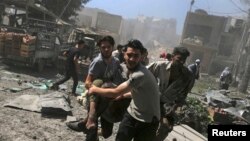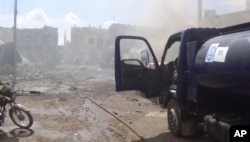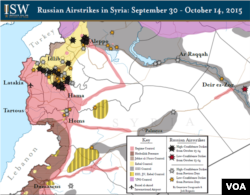In rebel-controlled parts of war-torn Syria, where the forces of President Bashar al-Assad have been expelled, a new breed of local councilors has emerged, administering what relief they can and striving to provide civilians with basic services.
Across parts of Syria, 416 local councils are now functioning in towns and villages and are under the control of neither the Assad regime or Islamic State extremists.
In some towns, council officials have been elected in rudimentary-run polls.
For the councils to keep on running, they have to navigate complex politics and negotiate with armed groups, and they are always short of funds. Their work amid Russian and Syrian airstrikes and skirmishes on the ground often leads them to defy Islamist and other rebel militias who want to control civilian as well as military affairs.
Civil society group
There wasn’t a main organizing hand behind the councils' emergence, says Mohammed, who works with the Local Administration Councils Unit, a civil society group that helps advise the councils.
“Those councils came randomly in different places and then there was some work on doing some real structure to have sub-councils, town councils, city councils and then the provincial councils," Mohammed said. "And we succeeded to have like now eight elected provincial councils in Syria, at least they are elected from the sub-councils.”
Many of the councils in rural Aleppo, rural Idlib and some areas in the countryside of Latakia, as well as in rebel-controlled towns ringing Damascus, originated as local relief efforts.
Activists soon realized with the Assad regime ousted, and hardline Islamist militias seeking to exert broad control, they needed to define areas of civilian responsibility, and to help provide electricity, water, health care and education.
Western officials view the councils' emergence as a civic breakthrough, one they hope may help to nudge the ideological direction of the rebellion, tempering its sectarianism and curtailing the power of radical Islamists by building up a groundswell of popular support for secular, accountable local governance.
Last month, Deputy U.S. Secretary of State Tony Blinken announced Washington was giving another $100 million to the moderate Syrian opposition, some of which will go to local governments inside Syria.
The U.S. has given $500 million in aid to the moderate Syrian opposition since 2012.
Strings attached
While they welcome the funding, some activists complain it comes with strings attached.
Activist Bassam al-Kuwaiti argues there’s a danger of Western donors dictating how local groups operate, and says funds and aid are too often misallocated by the donors. He cites food shipments as one example.
“Food is not needed to this level which is being sent now. A lot of it could be achieved through agricultural projects inside Syria, except besieged areas of course," al-Kuwaiti said.
Local council leaders agree, saying that the donors should listen more closely and provide what they truly need.






